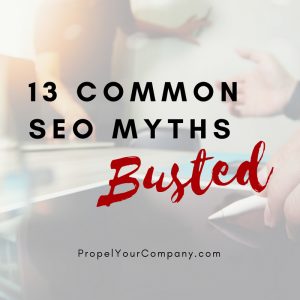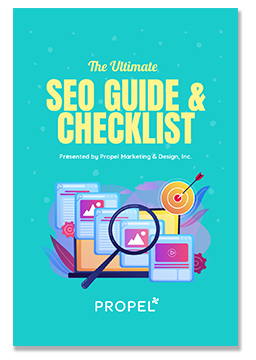
Today we are going over 13 common SEO myths.
There’s so much information out there when it comes to “best SEO practices.”
Some of it’s good. Some of it’s bad. Some of it is really bad. And, some of it can be a bit confusing or misleading.
So today we’re myth busting: SEO style.
So here we go…
SEO Myth #1: I need to submit my website to Google manually.
“When you do a Google search, you aren’t actually searching the web. You’re searching Google’s index of the internet, or at least as much of it as we can find.
We do this with software programs called spiders. Spiders start by fetching a few web pages, then they follow the links on those pages and fetch the pages they point to; and follow all the links on those pages, and fetch the pages they link to, and so on, until we’ve indexed a pretty big chunk of the web; many billions of pages stored on thousands of machines.”
– Matt Cutts, How Search Works
Truth: If your website is brand new, you can submit your URL to Google to be indexed. But as long as you have an XML sitemap set up and your technical on-page SEO is good, Google’s crawlers will find and index your site just fine.
Bonus Tip: If you’re running Yoast SEO make sure you have the XML sitemap enabled.
SEO Myth #2: Sitemaps aren’t important
Truth: Google makes a case for the importance of sitemaps.
A sitemap is a file the lists the web pages on your website that tells Google and other search engines about the organization of your site’s content.
“If your site’s pages are properly linked, our web crawlers can usually discover most of your site. Even so, a sitemap can improve the crawling of your site, particularly if your site meets one of the following criteria …” – Google
What are Google’s following criteria?
- Your site is really large.
- Your site has a vast archive of content pages that are isolated or well not linked to each other.
- Your site is new and has few external links to it.
- Your site uses rich media content.
Or on the flip side…
SEO Myth #3: Having an XML sitemap will increase my ranking
Truth: An XML sitemap helps the search engine spiders to navigate your site easily and index all of your content, but its existence isn’t a ranking factor.
Google will use your sitemaps file for discovery and potentially as a canonicalization hint if you have duplicate content. It won’t give a URL anymore “google juice” just because you include it in your sitemap, even if you assign a high priority level to it.
SEO Myth #4: I’m doing SEO… I have Google Analytics on my website
Another similar version to this:
- I have SEO Yoast (or insert another SEO plugin here) on my site. Therefore, I’m doing SEO.
Truth: Google Analytics, along with plugins like SEO Yoast are great at helping you with SEO. But they are just tools.
For you to benefit from these tools, you must use them.
Related Resources:
- 4 Ways to Boost Your SEO Rankings With Google Analytics
- Yoast: The definitive guide to higher rankings for WordPress sites
SEO Myth #5: If you buy ads on Google you’ll rank higher in organic listings
Another similar myth, but on the opposite side: If you don’t buy ads from Google, you’ll rank higher organically.
Truth: Buying ads on Google doesn’t affect your rankings.
Bonus Tip: Google ads do not affect your ranking, however, testing descriptions by running ads will tell you what text has a higher CTR (click through rate), and you can use the insight from these ads to adjust your meta titles and descriptions, to get better organic click-through rate.
SEO Myth #6: Title tags and meta descriptions are a ranking factor
Truth: These are not a direct ranking factor. The point of optimizing your title tags and meta descriptions are to encourage click-through rates. The more people click through to your site and stay on your site; the more Google will reward you.
“The myth that we see most often is the misconception that meta descriptions are a ranking factor. Although important for click-through rates, which are a direct ranking factor, a meta description by itself will not affect page rank without all other SEO components in place. That said, meta descriptions are still very important for searchers and should be part of every page optimization checklist.”
– Nina Hale, Nina Hale, Inc.
SEO Myth #7: Content marketing is the new SEO
Other myths that fall under the content marketing category include:
- Don’t worry about SEO, just make great content.
- Great content will always rank well.
Truth: Great content should be at the heart of your SEO strategy, but it shouldn’t be the only thing your focus. Technical SEO, link building, UX (user experience), and other traditional SEO strategies still play a part in ranking factors.
SEO Myth #8: You can boost the Google rankings of your home page for a targeted term by including that term in the anchor text of internal links
Truth: Internal links have very little impact on your homepage.
According to Moz:
In fact, for those who put a great deal of time into optimizing their links back to their homepage to say “new york apartments” or “antique rifles” rather than “home,” I’d test whether modification of the link anchor text has any adverse rankings impact. In my recent experience (on a few different sites), the answer is no.
-Moz.com
SEO Myth #9: The more backlinks you have, the better
Truth: Not all backlinks are created equal.
There is a common misconception in SEO that more is better, especially regarding backlinks. However, the quality of backlinks significantly trumps the quantity. In order to improve your ranking, you need to focus on high authority websites. In addition, you want a diverse backlink profile, with a multitude of referring domains. A few high-quality links are worth dozens of low-quality links.
– Jeff Grover, BestCompany.com
SEO Myth #10: There’s a penalty for duplicate content
Truth:
Contrary to popular belief, there is no duplicate content penalty. There is a filter. Essentially, when Google encounters two or more versions of the same page, they choose the most authoritative copy and filter out the rest. But, rest assured, your website will not be penalized for duplication of content
– Jon Clark, Fuze SEO, LLC
What Google does is simply ignore and disregard duplicate content. So if you’ve plagiarized your entire website’s content from elsewhere, don’t expect to rank.
SEO Myth #11: A good user experience falls outside of SEO
Truth: UX (user experience) hasn’t always fallen under the umbrella as a key factor in SEO, but times are changing! Part of Google’s outlook has always focused on delivering the best user experience. UX should be a high priority in your SEO campaign. The better your website serves the needs of the user, the more likely they are to stay on your website.
Related Resources:
SEO Myth #12: You must use exact match keyword in your content
Truth: While it can at times be hard to rank for a keyword term if you aren’t using it as an exact match, you still can. Intent matching matters more than exact keyword matching! The bonus to exact keyword matching (or a synonym) in your content and your title tag and page description is, so people know there in the right place.
Here’s the example I give in Writing for SEO :
If the searcher types in “how to make coffee” they’ll expect to see a title that has “coffee” in it, not a type of fancy coffee like “mocha.”
SEO Myth #13: I don’t need to include outbound links in my website – Linking out to authority sites sends organic visitors away
Other SEO Myth Related to anchor links:
I don’t need to include anchor links since I’ve got a simple website navigation
Truth:
“…. The objective is not to make your links appear natural, the objective is that your links are natural.” – Matt Cutts





![How to Write a Professional Chiropractic Bio [Template Included]](https://propelyourcompany.com/wp-content/uploads/write-a-bio-500x383.jpg)

